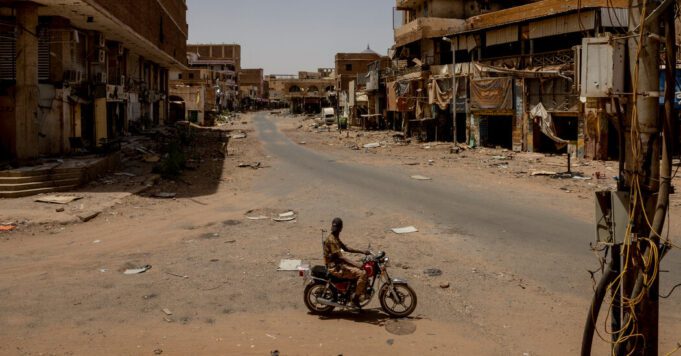Families eat in communal kitchens and get water from the Nile, he said, and showed us a mosque, a well-stocked pharmacy and apartments. His followers help bury the dead, and at night they perform zikir, a devotional dance that expresses Sufi spirituality. “It soothes our souls,” he said.
Food is still being served at the soup kitchen. Sheikh Elamin, a tall man in flowing green robes, said he paid for everything out of his own pocket. In addition to running a Sufi Muslim order with branches in London, New York and Dubai, he is also a businessman with a gold mine and a meat export business, he said.
Before the war, the sheikh was sometimes criticized for his extravagant choices, such as chartering a private jet to travel to the 2022 World Cup in Qatar. But he is now winning praise for his philanthropy.
“In times of war, he has become the most popular figure in the country, and that’s it,” said Suliman Baldo, a veteran Sudan analyst. “People need something positive to hold them over.”
Nearby, we passed a large mural of the word “freedom,” covered in gunfire, left over from protests in 2019. Across the street, men gathered around a bubbling pot of lentils, preparing to return to their destroyed homes — a cautious gesture of hope as war drags on.
“If God wishes, we will have a bright future,” said Mahmoud Mustafa, a rickshaw driver holding a plastic food bowl.
He didn't even flinch when another artillery barrage sounded and more shells flew across the Nile.
militia
Hundreds of young women dressed in black marched in unison through a schoolyard in Omdurman early one morning, the latest in a rapidly expanding conflict.
The war began as a dispute between two men – General Abdel Fattah al-Burhan, Sudan's army chief of staff, and Lt. Gen. Mohammed Hamdan, the leader of the Rapid Support Forces. But since last fall, when a string of Rapid Support Force victories sparked widespread panic, a slew of armed groups have joined the fight, most of them supporting the military. Among them are rebels from Darfur, ethnic militias, Islamists once loyal to former President Omar al-Bashir, and thousands of young men and women recruited from the streets.
Even idealistic young Sudanese who had risked their lives to protest against Bashir and later the military have joined in.









